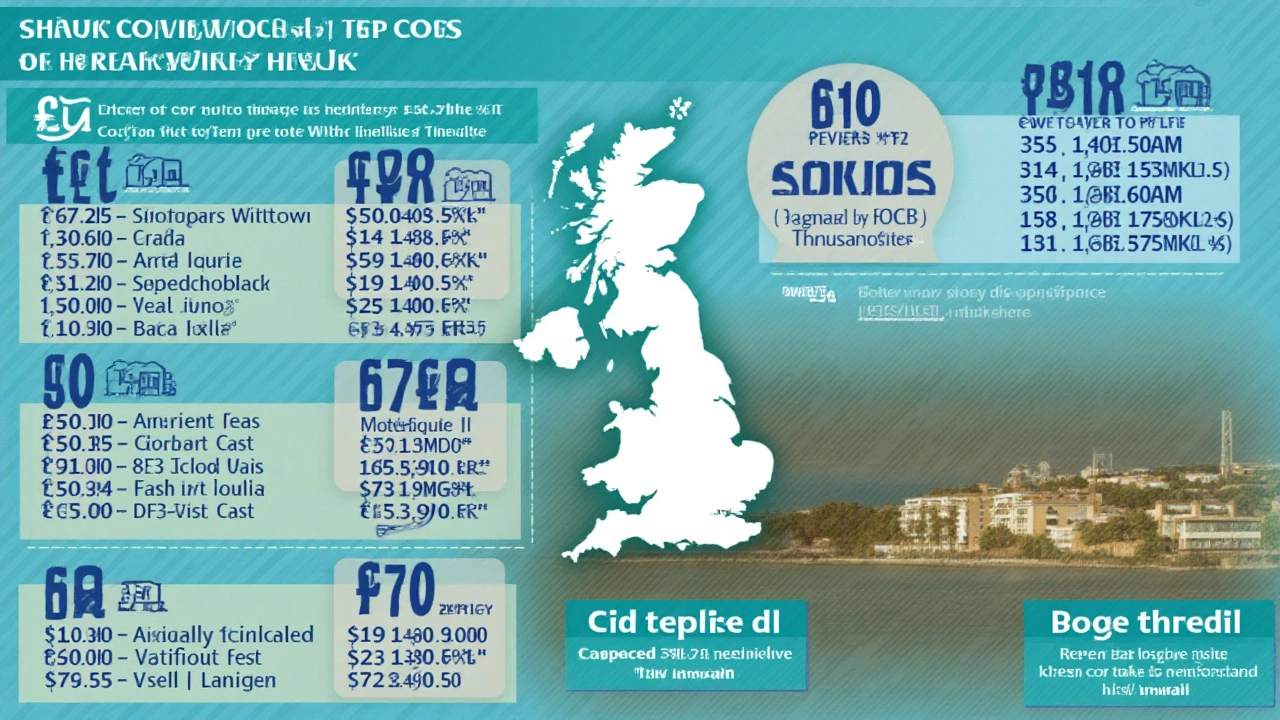Average Annual Costs of Timeshare Ownership in 2025
 Jan, 27 2025
Jan, 27 2025
For those dreaming of a vacation home without the year-round commitment, a timeshare can seem like a dream come true. It's like owning a piece of your favorite getaway spot. Yet, to make an informed decision, it's important to understand the financial commitment involved in timeshare ownership, particularly the costs incurred on an annual basis.
These yearly expenses go beyond just the initial purchase price. By delving into the details of annual fees, potential additional costs, and practical tips for budgeting, you can better assess whether a timeshare aligns with your financial plans and vacation expectations. Let's explore what you're actually paying for when you decide to join the world of shared vacation ownership.
- Understanding Basic Fees
- Additional Costs to Consider
- Tips for Budgeting
- Evaluating Financial Feasibility
Understanding Basic Fees
When venturing into the realm of timeshare ownership, grasping the concept of basic fees is crucial. These expenses form the foundation of your commitment to this unique style of vacationing. At the heart of these costs lies the annual maintenance fee. This fee funds the upkeep of the property, ensuring every return visit is as enjoyable as the last. Typically ranging anywhere from a few hundred to several thousand dollars, the maintenance fee is non-negotiable and tends to increase periodically to match inflation and cover rising costs. Owners should expect a 3 to 5 percent per annum rise, making it a factor to consider in long-term budgeting.
Another notable basic fee is the real estate tax associated with your shared ownership. Timeshares are treated as real estate, subjecting you to property taxes in the jurisdiction where the timeshare resides. This fee is often included with the maintenance fee or billed separately. It’s essential to clarify this with your management company to avoid surprises. An additional fee often overlooked is the special assessment. This is not always applicable; however, it can surface when extensive upgrades or repairs are required that the maintenance budget cannot cover. Owners might collectively shoulder the cost of a significant roof repair or a new communal pool through a special assessment.
Companies sometimes charge membership or club dues, which grant access to a network of properties or priority booking options. While they offer tremendous flexibility, they also represent an additional cost that you should account for. Knowing where each dollar goes can demystify the timeshare expenses and help potential owners gauge financial involvement accurately. As industry expert Robert Emerson once said,
"Understanding the full spectrum of fees involved in timeshare ownership can make the difference between a delightful getaway and a financial headache."By being informed about these basic charges and anticipating increases, a timeshare can suit your financial outlook and vacation desires seamlessly.

Additional Costs to Consider
When exploring the landscape of timeshare expenses, it's crucial to look beyond the basic fees that typically include maintenance and property taxes. Additional costs can lurk quietly beneath the surface, ready to surprise the unwary owner. These can also have a substantial impact on your annual financial commitment. One of the common extra expenditures is the special assessment fee. Properties occasionally require unexpected improvements or repairs that aren't covered by regular fees. Owners might face hundreds or even thousands of dollars more when an association votes to renovate a pool or replace an aged roof. Such assessments can certainly add an unpredictable element to the cost of owning a timeshare.
Consider the impact of exchange fees as well. Many owners value the ability to swap their time at one resort for a different location through a timeshare exchange company. However, each exchange usually incurs a fee. While the comfort of knowing you can vacation in diverse settings is appealing, these exchange costs can silently accumulate if frequent swaps are in your plans. Be sure to factor these expenses into your projected annual budget so they're not overlooked and lead to unpleasant surprises. It's also worth noting that most of these fees must be paid upfront, adding another layer of complexity to financial planning for avid travelers.
Another important factor to remember is the potential resale cost. While not a direct expense, considering the resale value of your timeshare should play a role in your ownership strategy. Markets fluctuate based on demand, location, and the size or season of your timeshare, which could drastically affect your ability to regain your initial financial outlay. A study conducted by the American Resort Development Association reveals that resale prices often don't meet owners' expectations. Financial losses incurred from an attempted resale can thus be viewed as ancillary costs associated with timeshare ownership. Understanding this in advance can prepare you for any long-term financial planning or adjustments you might need to make.
To gain further insight into the potential expenses timeshare owners face, Karen Johnson, a financial advisor, once remarked, "While the allure of vacation flexibility is undeniable, prospective buyers must scrutinize every potential cost. Proper evaluation and planning can be a game-changer in maintaining a balanced financial approach when considering timeshare ownership."
"While the allure of vacation flexibility is undeniable, prospective buyers must scrutinize every potential cost. Proper evaluation and planning can be a game-changer in maintaining a balanced financial approach when considering timeshare ownership." - Karen Johnson, Financial AdvisorPlanning for these additional costs demands vigilance and foresight, ensuring vacation tranquility is maintained rather than disrupted by unwelcome financial strain. With careful consideration and comprehensive financial mapping, timeshare ownership can become a feasible and enjoyable venture for families.
Other Considerations
What many don't anticipate is the possible involvement of travel costs, particularly if your timeshare location is far from home. These include airfare, car rentals, and additional baggage fees, depending on the duration and requirements of your vacation. It's advisable to plan meticulously to avoid spending unnecessarily. Upon considering every transport element, one gains a comprehensive understanding of the holiday’s financial demands ahead of time. And, of course, there's always the allure of activities and attractions near the timeshare, which can further stretch your budget if not accounted for in advance.
There are definite advantages to owning a vacation ownership, and anticipating these assorted costs strengthens owner's capability to enjoy benefits without financial anxiety. By meticulously planning for each foreseeable cost, savvy vacationers ensure the idyllic dream of timeshare owning doesn't morph into a financial nightmare.

Tips for Budgeting
Embarking on the journey of timeshare ownership requires careful consideration of your financial landscape. To avoid unforeseen expenses, it's vital to lay out a comprehensive budget, factoring in all known and potential costs. One of the primary steps in budgeting is understanding the basic and additional costs you might incur annually. While average maintenance fees could start from several hundred dollars to upwards of a thousand depending on location or amenities, there are often hidden costs that surface unexpectedly.
These might include special assessments for property improvements or higher association dues in some years. Make it a point to gather all necessary information upfront from the timeshare management. Consider sitting down with a financial planner; sometimes, taking a broader perspective can illuminate blind spots in long-term financial commitments. As with any vacation ownership, flexibility is crucial, and setting aside a contingency fund can provide peace of mind in the face of unexpected financial demands.
Evaluate and Track Costs Regularly
Regular assessments can significantly aid in managing expenses. Once you've established a basic budget, it's essential to revisit it bi-annually or annually to incorporate any deviations or modifications to the original plan. Creating a simple spreadsheet, or using budgeting apps, can track expenditures effortlessly, ensuring nothing slips through the cracks. Additionally, bear in mind inflation and potential fluctuations in the hospitality sector, which might influence maintenance fees or property taxes over time.
Insurance is another angle to consider when calculating overall expenses. Checking whether your timeshare requires additional insurance or if it falls under your existing homeowner’s policy could save you from unnecessary policy costs. It is pivotal to stay informed about market trends and adjust your financial strategies accordingly. Consult veteran timeshare owners to glean insights from their experiences, which can offer practical advice on managing costs effectively.
"Timeshare ownership is not just about the joy of vacations; it's a commitment that demands financial diligence. Regular cost assessment and efficient budgeting ensure that you continue to enjoy your time away without straining your finances," advises John Hughes, a well-regarded financial consultant specializing in property investments.
Similarly, consider when best to purchase a timeshare. Many people find they secure better deals during low seasons, when the demand is not as high, and sellers might be more willing to negotiate on price or offer incentives. Timing can play a strategic role in how much you end up spending in the long run. Use forums and community groups as valuable resources to gather insights from seasoned owners who have navigated these waters before.
| Expense Item | Estimated Annual Cost |
|---|---|
| Maintenance Fees | $800 - $1,200 |
| Special Assessments | $0 - $300 (as needed) |
| Property Taxes | $100 - $400 |
| Insurance Costs | $200 - $500 |
Maintaining open communication with the property management and understanding the financial landscape allows you to effectively contribute to owners' meetings, where financial decisions are made. This ensures you remain informed about any upcoming changes and helps avoid budgetary surprises. Remember, vigilance and proactive financial planning convert the exhilaration of timeshare ownership into a more sustainable and enjoyable adventure.

Evaluating Financial Feasibility
Understanding the financial feasibility of a timeshare cost requires more than just a passing glance at the initial purchase price. Many first-time buyers find themselves drawn to the idea of owning a slice of vacation paradise, but these dreams can quickly become overshadowed by unexpected financial realities. To make a well-informed decision, potential timeshare owners should delve into a comprehensive evaluation of both immediate and long-term costs, coupled with a realistic assessment of personal financial standing.
Begin by considering the primary expenses, such as the initial purchase price, which can vary significantly based on location, time of year, and even the amenities included. The purchase price is often just a small fraction of the total cost, as there are annual maintenance fees to factor in. These fees ensure the upkeep of the property and can range anywhere from hundreds to thousands of dollars annually, depending on the resort's stature and the unit type. Interestingly, these maintenance fees have been known to increase over time, sometimes surpassing inflation rates, thus impacting the shared ownership budget more than initially anticipated.
Another crucial element in evaluating the financial feasibility is anticipating potential special assessments. Occasionally, timeshare resorts might need significant repairs or upgrades, prompting a call for additional fees from owners. On top of these expenses, there are occasional booking fees, as well as travel costs, to consider. All these seemingly little expenses can cumulatively impact your budget. This is why a detailed and honest budget that considers all possible scenarios is invaluable.
According to the American Resorts Development Association, "In 2023, the average timeshare maintenance fee was approximately $1,000, with a projected annual increase of up to 5%."
Evaluating one’s lifestyle is also a meaningful part of this process. Regular vacation spots may affect whether owning a timeshare is the right choice or if a flexible vacation rental setup might be more compatible. Some timeshare packages offer exchange programs, which allow owners to trade their weeks for stays at other resorts, but this flexibility often comes with extra costs. Examining these options thoroughly can reveal whether these additions truly align with your preferences and financial situation.
Consider consulting a financial advisor to help foresee any unforeseeable expenses before making any substantial decisions. Getting an expert’s opinion could shed light on potential pitfalls and provide a broader perspective on maintaining financial solvency while owning a vacation ownership property. Additionally, tapping into resources and forums that connect prospective or current timeshare owners can provide real-life insights and possibly prevent buyer's remorse.
| Expense Type | Estimated Cost (Annual) |
|---|---|
| Maintenance Fees | $1,000 - $2,500 |
| Special Assessments | $100 - $500 |
| Exchange Program Membership | $150 - $250 |
In conclusion, analyzing a timeshare expense is not just about counting pennies; it's about thoroughly assessing each contributing factor to ensure it won't lead to financial strain. A well-crafted spending plan accompanied by a dose of common sense about the potential financial shifts can help create a balance and provide a clearer picture of whether the joy of owning a vacation destination resonates with your tactical financial strategy. It starts with understanding and continues with meticulous planning, reflecting a true convergence of exciting experiences with prudent spending.